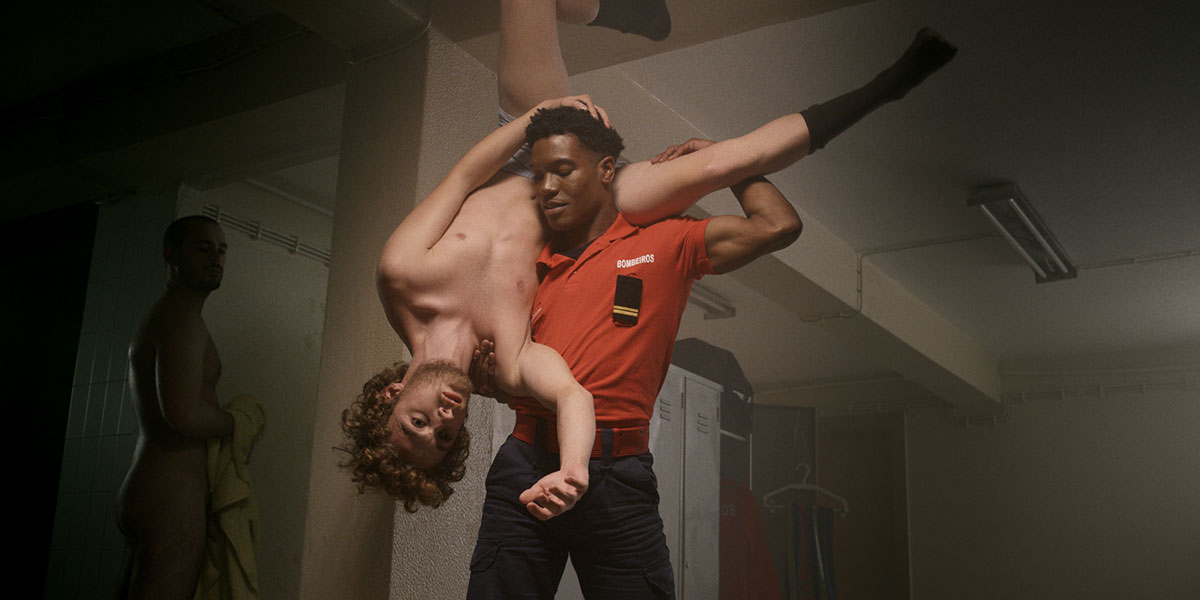Falling somewhere between high-art trash, an experimental movie musical and a potent political manifesto, Will-o’-the-Wisp is unlike anything I’ve seen before. Portuguese auteur João Pedro Rodrigues (The Ornithologist) stages a audacious study of class, race, colonialism and queerness through a time-hopping musical odyssey. At a mere 67 minutes, Will-o-the-Wisp is highbrow cinephilia that engages the heart, mind and body in an intoxicatingly peculiar experience. Anyone in search of something strange and new must see this provocative enigma.
The film starts in the year 2069—numbers that foreshadow much of the action to come—as King Alfredo looks back on his life from his deathbed. Rodrigues flashes back to the days when Alfredo was a youthful and sprightly prince (played by Mauro Costa). A striking tableau shot observes as the royal family sups in the opulence of their ornate dining room. Chandeliers hang elegantly in the richly detailed frame, while every golden element in the room courtesy of production designer João Rui Guerra glistens with the colonial blood that was spilled in service of the family’s excess wealth. To accentuate the colonial resonance for anyone not getting the picture, some antiquity equivalent of Sambo statues pepper the room.
The family sombrely dines while the television brings news of violence and tragedy in the background. The royals remain stoic and barely register these reports from outside the palace walls, instead diverting their attention to the dogs munching away on meals fit for a king. This preamble—the title card doesn’t appear for at least 10 minutes—situates Alfredo within a family that’s never had to care about anything beyond satisfying the body’s desires.
The Baroque family dinner yields to the freeing openness of the woods as Alfredo encounters life, love and lust throughout a droll musical number. The sequence is a jolt of fairy-tale reverie as figures traipse through the forest, singing off-key verses while caressing the bountiful wood before their feet.
Rodrigues embraces the phallic nature of the woodland as Alfredo observes the scorched earth marked by wildfires. He summons his royal duty and becomes a firefighter. As the story cuts to the firehouse, Alfredo blushes in the presence of his smoking-hot instructor Afonso (an excellent André Cabral). The fire station provides a hub of unexpected homoeroticism—or, perhaps, convenient homoeroticism with all those shiny poles. However, Will-o’-the-Wisp is a Rodrigues film, and these aren’t any ordinary firefighters. They’re buff art aficionados who roam around the locker room as if it’s a bathhouse. They initiate Alfredo by modelling classic portraits for their next calendar, all of which are well endowed by firehoses.
Rodrigues is in his element in the fire-hall act of Will-o’-the-Wisp as he offers the most stylized and erotic piece of the film. As the firefighters pose in jockstraps, Alfredo finds new freedom in the company of men. He follows the lead of Afonso, who is Black, and submits to his superior. The film creates a delicate seduction as Afonso dominates Alfredo while tenderly teaching him the fireman’s duties. (This includes quite possibly the most erotic CPR scene ever put to film.)
There’s also an intentional element of exoticism to their physical encounters, from which Will-o’-the-Wisp doesn’t shy away. In the film’s most explicit set piece, the firefighters drop trou during an excursion. They perform mutual handjobs and talk dirty by whispering racial slurs as tender epithets. Through acts and words—and, yes, a little cum—Will-o’-the-Wisp provocatively illustrates how dynamics of class, race and privilege permeate even marginalized communities. Rodrigues asks if Alfredo’s submissiveness to Afonso is more fetish than freedom, as if the fireman is merely another Sambo statue with which the prince can slake his lust.
Will-o’-the-Wisp explores Alfredo’s political and sexual awakening further through a hodgepodge of vignettes. Family dinner returns, but the second course is served proudly from the left as Alfredo enacts a kind of verbatim theatre by reciting youth activist Greta Thunberg’s “How dare you!” address to the United Nations. As Will-o’-the-Wisp careens from one vignette to another, it creates entirely new tones, tempos and atmospheres thanks to the cinematography by Rui Poças. The result is, admittedly, disjointed, but Rodrigues doesn’t seem to aim for a united front. Instead, this highly stylized affair harnesses elements of both the movie musical and political thriller to evoke elements of performativity and passing. Alfredo can easily move from one realm and one genre to the other. Afonso, meanwhile, finds himself relegated to moments of the young prince’s desire.
The film marks a striking turn of form for Rodrigues following the kinky naturalism of The Ornithologist, which depicted an ill-fated canoe ride shot entirely on location in the woods. (Complete with sex, murder and urination.) Will-o’-the-Wisp is even more of an acquired taste than the dark debauchery of The Ornithologist, but it is further proof that Rodrigues is among the more formally ambitious stylists in global queer cinema. He’s also one of the more playful ones. Will-o’-the-Wisp evokes elements of the impending end of days with its burned forests and unheard manifestos. If the world is indeed on fire, it suggests that all we can do is go out dancing.


 Why you can trust Xtra
Why you can trust Xtra


